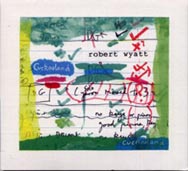
Robert
Wyatt
Cuckooland
(Hannibal)
It’s absolutely impossible not to feel very glad when getting the
news that a new Robert Wyatt CD is about to be released: there are not many
musicians who can combine a very high level of artistry, lotsa personal courage,
a deep sense of humanity towards the poor and the oppressed, defiant political
positions. It’s very easy to consider him as "one of the family"
even if one knows him only for his music and his interviews.
And it’s nice to see that the number of his fans is increasing. Sure,
when it comes to the world of media one could cynically notice that the degree
of attention in the coverage made a quantum leap as soon as Rykodisc took
the place of the tiny Rough Trade – and sure Rykodisc is able to make its
list of priorities apparent. But since it’s Robert Wyatt we are talking about,
what’s not to like?
Anyway, it’s a bit curious to notice how in a way a Robert Wyatt
record has become – like those by Sting and David Sylvian (it would be great
to investigate how much those categories overlap on the side of the buyer)
– a sort of "treasure goods" for those who, with the passing of
the time, and given the absolutely crazy price of CDs, see Wyatt as an artist
of absolute artistic integrity who will never let you down for commercial
reasons, dignity (and big love of music) being his number one priority. Even
if personal considerations should have no place in music criticism (but there
are those who believe the opposite to be true), I think that at the time when
Shleep (1997) was released after a long silence the relief for his non-disappearance
could have masked some problems that the record showed.
Personal tastes aside, one could ask oneself what kind of judgment
criteria one should use. There are quite a few people who mostly for age reasons
know only Shleep. Their judgment will be a lot easier to make, since they
have not the burden of a long listening history. On the other hand, knowing
from memory all the notes from his albums could put one in the strange position
of having to judge his new work in the light of the peaks from his past, first
of all the album Rock Bottom (1974), which in many ways can be considered
a one-off. Of course, we could also discuss whether a kind of judgment like
"what has been released this year that’s better?" could suffice.
It’s a long intro to a CD review, but it’s a long CD, too: 75+ minutes,
like an old double LP of the old days. It’s a record where it’s easy at first
to get lost but which after many listening sessions remained for me curiously
lacking something, with a lack of a "unifying" factor/feel ("do
we always need a unifying factor?" is an interesting question), if not
for some timbral/production traits I’ll mention later. Sure, Ruth Is Stranger
Than Richard (1975) was not a very coherent album, but I imagine that in that
occasion budget problems played their part (but listening to Gary Windo, Fred
Frith and Bill MacCormick is not the same thing as listening to Paul Weller,
Karen Mantler or Annie Whitehead), but here I believe the work was made at
a relaxed pace.
Budget factors could very well explain the nakedness of albums like
Old Rottenhat (1985) and Dondestan (1991). But there, Wyatt’s limpid melodicism
had turned a problem into an asset. Sure, that naked atmosphere which rewarded
an attentive listener could be a stumbling block for the "easy thrill
seekers" and those of short attention spans. The opposite could be true
for this album, whose excessive length (and some really strange keyboard timbres,
which often sport sampled vocals) could well accommodate those who are easily
distracted. (But I think that 7’55" of Forest are really too much.)
If keyboards are maybe the most questionable aspect of this record
(it was since the times of the early Minimoog that I had not heard such types
of filter modulations as heard on Tom Hay’s Fox and Brian The Fox), very good
news come from the wind instruments: Wyatt plays the trumpet and the cornet,
there are fine saxophones and clarinets by Gilad Atzmon, nice trombone by
Annie Whitehead; Wyatt’s voice is always musically captivating, even if a
bit different, as it’s common with age.
Already the credits on Shleep had told us of a not very prolific writer,
hence the songs written by others, which gave the record a bit of a fractured
feel. This problem seems to me to have become worse, which to me makes the
decision of such a long work even more mysterious. I had to get to Lullaby
For Hamza, the track number eight at the close of the first part of the CD,
to find a song that could without a doubt be considered excellent (by his
standards, of course). A problem that’s only made worse by some nice covers
– see Raining In My Heart, for piano, and Insensatez by Antonio Carlos Jobim
sung with great sensibility by Wyatt and Karen Mantler, with a fine clarinet
performance by Gilad Atzmon. Mantler’s contributions left me puzzled: they
are quite good, but they seem to belong to another record – see Beware and
Life Is Sheep, while Mister E sounds quite like a fragment from Silence, the
Michael Mantler album where Wyatt sang alongside Carla Bley.
Besides Lullaby For Hamza there are many beautiful originals: Just
A Bit, Old Europe, Cuckoo Madame, Trickle Down, Foreign Accents, while an
instrumental version of La Ahada Yalam is a nice close.
Will I change my mind in a few months?
Beppe Colli
© Beppe Colli 2003
CloudsandClocks.net | Oct. 7, 2003


